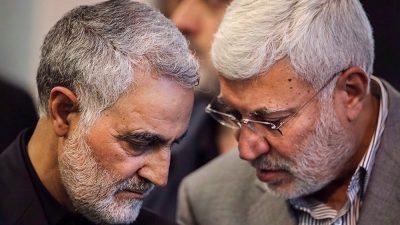Lawsuit Filed in Iraq Against Trump, Aides for Assassination of Qassem Soleimani and Al-Muhandis
Soleimani and Muhandis were key figures in the fight against the Islamic State in Iraq and Syria. They were assassinated in a drone attack on January 3, 2020, ordered by former US President Donald Trump

All Global Research articles can be read in 51 languages by activating the Translate Website button below the author’s name.
To receive Global Research’s Daily Newsletter (selected articles), click here.
Follow us on Instagram and Twitter and subscribe to our Telegram Channel. Feel free to repost and share widely Global Research articles.
***
Almost two years after the assassination of Qassem Soleimani and Abu Mahdi al-Muhandis in a US drone strike in Baghdad, at least 78 Iraqis filed a lawsuit in an Iraqi court on Sunday, November 27, against then US President Donald Trump and other officials of his administration.
The plaintiffs demanded legal action against the accused, including Trump and his Secretary of State Mike Pompeo, among others, in their petition filed at Baghdad’s federal court of appeal. The plaintiffs include the brother of Abu Mahdi al-Muhandis, Muhammad Hassan Jaafar al-Muhandis.
Though the new Iraqi government led by Prime Minister Shia al-Sudani had promised to take legal action against Trump once in power, it is not clear whether the plaintiffs have the backing of the government or not.
Lieutenant General Qassem Soleimani, commander of Iran’s elite al-Quds forces, part of the Islamic Revolutionary Guards Corps (IRGC), and Muhandis, commander of the Iraqi militia Popular Mobilization Forces (PMF), were assassinated in a drone attack on January 3, 2020, near the Baghdad airport.
Trump later claimed responsibility for the assassinations, accusing Soleimani of being a terrorist and being involved in plotting “sinister attacks” on Americans. The US had categorized the IRGC as a foreign terrorist organization in April 2019, part of the series of sanctions imposed on Iran following the US’ unilateral withdrawal from the Iran nuclear deal or the Joint Comprehensive Plan of Action (JCPOA).
Assassinations triggered popular protests and strong regional response
Both Soleimani and Muhandis were celebrated in Iran and Iraq for playing key roles in fighting against the Islamic State (IS) and reversing its advances. Prior to its defeat, ISIS had taken control over a large part of Iraq and Syria.
The assassinations invited a strong reaction from Iran and mass protests in both Iran and Iraq. Within a couple of days, the Iraqi parliament adopted a resolution asking the government to ensure that all foreign troops leave the country.
On January 7, an Iraqi court issued an arrest warrant against Trump for murder under the Iraqi penal code.
On January 8, Iran launched several rockets at Iraq’s Ain Al-Assad military base where a significant section of the US soldiers in the country were stationed. While there were reportedly no deaths, over 100 US soldiers were injured.
Iran also demanded an immediate withdrawal of all foreign troops from the region.
Following the assassinations, the US-led international forces came under heavy attacks from local militias, forcing their gradual withdrawal or relocation.
In April this year, US State Department spokesperson Ned Price admitted that the intensity and frequency of attacks on foreign troops in Iraq increased following the US assassination of Soleimani and Muhandis. He noted that between 2018 and 2020, attacks on US forces increased by 400%.
Frequent attacks and rising popular protests in Iraq against the presence of foreign forces, as well as the Iraqi parliament’s resolution forced the government led by Mustafa al-Kadhimi to negotiate with the US government, which ultimately led to the withdrawal of most of the US forces. The US claims that those that remained in Iraq are not there for combative purposes but for training and support.
*
Note to readers: Please click the share buttons above. Follow us on Instagram and Twitter and subscribe to our Telegram Channel. Feel free to repost and share widely Global Research articles.
Featured image: Lieutenant General Qassem Soleimani (L) and Abu Mahdi al-Muhandis. (Photo: Tasnim news agency)

